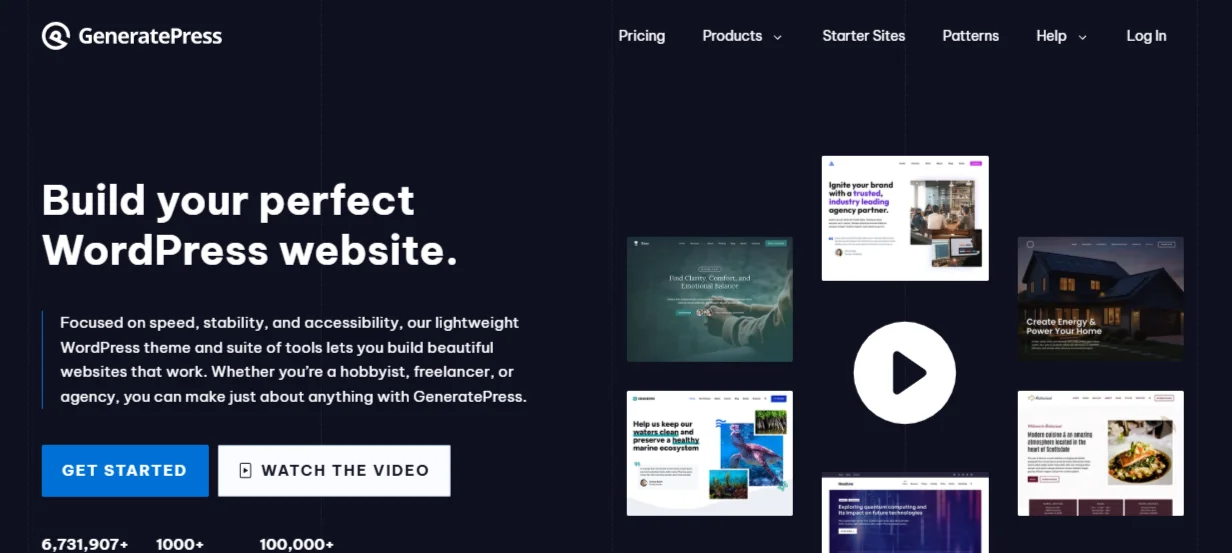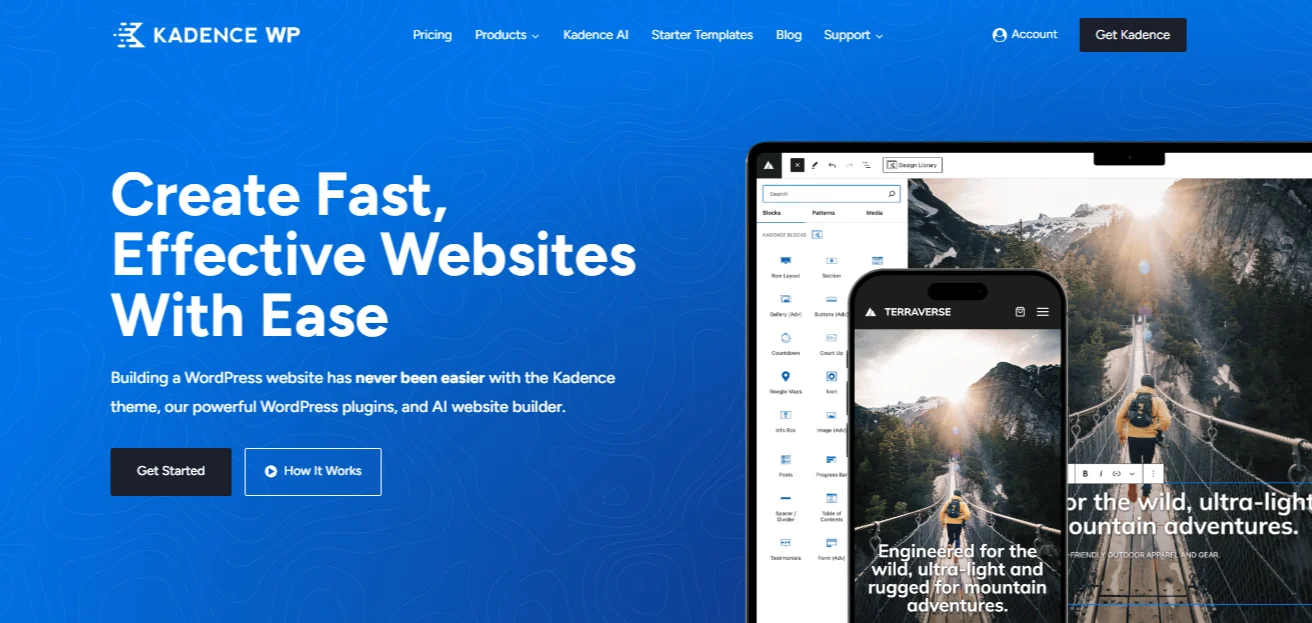Choosing the right WordPress theme is one of the most important technical SEO decisions you will make for your site in 2025. The theme directly influences your site’s code quality, loading speed, mobile experience, and how easily search engines can crawl and understand your content.
An SEO-friendly theme helps you load pages faster, reduce bounce rates, and give users a smoother experience, which all feed into better search visibility. In this guide, the focus is on what makes a theme SEO-optimized today and a curated list of top WordPress themes that balance speed, clean code, and flexibility.
What Makes a WordPress Theme SEO-Friendly in 2025?
An SEO-friendly WordPress theme is built with performance, crawlability, and modern web standards at its core, not just visual design. It avoids unnecessary bloat, follows coding best practices, and supports the tools and structured data that help search engines interpret your pages correctly.
Key characteristics that define an SEO-optimized theme in 2025 include the following elements.
- Lightweight and clean code: Themes that avoid excessive scripts, inline styles, and unnecessary features generally load faster and are easier for search engines to crawl. Clean, standards-compliant code reduces render-blocking resources and lowers the risk of conflicts with plugins or core updates.
- Fast loading speeds and performance optimization: Speed is a confirmed ranking factor, and Core Web Vitals (like Largest Contentful Paint and Cumulative Layout Shift) are now central to search performance. Themes optimized for speed minimize HTTP requests, support efficient asset loading, and often pair well with caching and optimization plugins.
- Mobile responsiveness and mobile-first design: With the majority of web traffic coming from mobile and Google’s mobile-first indexing, a responsive theme is non-negotiable. Good themes adapt layouts fluidly to different screen sizes and keep tap targets, fonts, and navigation usable on smaller devices.
- Schema markup and structured data support: Some themes are built with basic schema markup (like article, blog, or product structures) or integrate smoothly with schema plugins. This structured data support can improve rich result eligibility and help search engines better interpret page context.
- Compatibility with popular SEO plugins: Modern SEO workflows rely heavily on plugins such as Yoast SEO, All in One SEO, Rank Math, and similar tools. A good theme does not conflict with these plugins, respects their meta output, and allows easy control of title tags, meta descriptions, and canonical URLs.
- Regular updates and security fixes: Frequently updated themes stay compatible with the latest WordPress core, PHP versions, and browser changes, which reduces security risks. Security and stability indirectly affect SEO by preventing downtime, hack-related spam, or broken experiences that can hurt rankings.
- Cross-browser compatibility: SEO-friendly themes are tested across major browsers (Chrome, Firefox, Safari, Edge) to ensure consistent rendering. Consistent experiences across browsers reduce unexpected layout issues that can hurt engagement signals like time on site and bounce rate.
Key Features to Look for in SEO-Optimized WordPress Themes
Beyond general SEO-friendliness, there are specific, practical features to check when evaluating a theme for your site. These features influence both technical performance and ongoing content management workflows.
- Speed and performance benchmarks: Many theme developers now publish performance tests or GTmetrix/PageSpeed results for their demos. Look for themes that are known to achieve strong Core Web Vitals scores and minimal page size out of the box before heavy customization.
- Responsive and mobile-first design: A theme should adapt layouts, typography, and images automatically across mobile, tablet, and desktop without requiring separate templates. Mobile-first approaches usually mean the design is built for smaller screens first, then enhanced for larger ones, which helps keep mobile performance strong.
- Integration with page builders (Elementor, Gutenberg, WPBakery): Many site owners and agencies rely on drag-and-drop builders; some themes are built specifically to work with a particular builder. Good SEO themes integrate without adding excessive markup or conflicting scripts, and they allow you to keep layouts clean when using builders.
- Customization options without code bloat: Ideally, a theme offers design flexibility through the Customizer or block patterns but does not pack dozens of features you will never use. Overly feature-rich themes can slow down sites, while lean themes with modular options let you enable only the components you need.
- Support for multimedia and rich content: SEO strategies in 2025 lean heavily on rich media: images, embedded video, and interactive blocks. Themes should handle image sizes, responsive embeds, and galleries efficiently so rich content does not tank performance.
- Accessibility standards compliance: Accessibility-friendly themes that follow guidelines like WCAG are better for users and can support SEO through improved usability. Some themes explicitly note accessibility-ready status, which means they include semantic structure, keyboard navigation, and readable contrast.
- WooCommerce compatibility for e-commerce sites: If you run an online store, the theme should integrate cleanly with WooCommerce, including product templates, carts, and checkout. Well-integrated WooCommerce themes maintain speed and structured data outputs needed for product-rich results and good UX.
Top SEO-Friendly WordPress Themes for 2025
There are many capable themes in the market, but a handful consistently stand out for their balance of speed, flexibility, and SEO-conscious design. The following options are widely used, actively maintained, and recommended across multiple expert roundups for SEO and performance.
1. GeneratePress

GeneratePress is known for being one of the most lightweight and performance-focused WordPress themes available. Its core theme is small in file size, which helps sites reach fast load times and strong Core Web Vitals scores.
From an SEO perspective, GeneratePress emphasizes clean, validated code and avoids unnecessary dependencies. The premium version adds a block-based site builder approach and layout controls, yet it keeps features modular so you only activate what you need, reducing bloat.
- Built with performance and minimal code as core priorities.
- Compatible with Gutenberg, Elementor, and major SEO plugins.
- Offers schema-friendly markup and accessibility considerations in its structure.
2. Astra

Astra has become a popular choice for both small businesses and agencies because it combines speed with a large library of starter templates. Its default setup is designed to be lightweight, and it can be extended with optional modules in the pro version.
For SEO, Astra is built to work seamlessly with plugins like Yoast SEO, Rank Math, and WooCommerce, while maintaining performance. It also integrates tightly with page builders such as Elementor and Beaver Builder, making it easier to create custom layouts without custom code.
- Known for fast performance and small default page sizes.
- Large selection of importable starter sites for different niches and industries.
- Good compatibility with SEO and caching plugins commonly used in optimization stacks.
3. Kadence

Kadence is a multi-purpose theme that focuses on speed and modern design patterns while giving users detailed control over layout and styling. It is built to pair well with the block editor and major page builders, which makes it flexible for various site types.
The theme incorporates SEO-friendly markup and is engineered to stay lightweight even when using more advanced design options. Kadence also offers header and footer builders and global typography/color controls, which help maintain visual consistency without piling on extra plugins.
- Emphasizes performance and modern, block-based layouts.
- Integrates with WooCommerce and popular builders for flexible site designs.
- Uses SEO-conscious code structure and schema-friendly patterns.
4. Hello by Elementor
Hello is a bare-bones theme created specifically to serve as a lightweight foundation for Elementor-built sites. It intentionally includes very minimal styling and features out of the box, leaving layout and design almost entirely to the page builder.
Because of this minimalist approach, Hello is extremely small and fast, which is helpful when combined with efficient Elementor designs and proper optimization. It is responsive, regularly updated, and designed to avoid conflicts with Elementor’s features.
- Ultra-light theme designed for Elementor users seeking maximum control.
- Minimal code footprint, which can translate into faster loading when combined with good practices.
- Regularly maintained to keep pace with Elementor updates and WordPress core.
5. Neve
Neve is a versatile, performance-focused theme built to work well with Gutenberg and multiple page builders. It is known for its fast loading times and is marketed as being suitable for businesses, blogs, and e-commerce projects alike.
The theme supports AMP, which can be useful for sites targeting high-speed mobile experiences and improved mobile search performance. Neve also provides starter sites and customization controls through the Customizer, helping site owners shape their design without compromising speed too heavily.
- Offers fast performance and AMP compatibility for better mobile experiences.
- Integrates smoothly with WooCommerce and multiple builders.
- Maintains clean code and frequent updates for long-term stability.
Also Read: 10 Best Website Builders To Consider In 2026
Honorable Mentions
Beyond the core list above, several other themes are often recommended in expert roundups for their blend of performance, flexibility, and SEO-awareness. These may be more niche-specific or design opinionated, but they remain strong candidates for many projects.
1. OceanWP
OceanWP is a feature-rich theme with extensive customization options and strong WooCommerce support, making it suitable for content and store-heavy sites. While it includes more functionality than some ultra-minimal themes, it is still considered performance-conscious when configured carefully.
2. Ultra
Ultra is a flexible, multi-purpose theme with pre-built layouts geared towards agencies, portfolios, and businesses. It focuses more on design variety, but remains compatible with key SEO plugins and performance optimizations.
3. Other notable SEO-focused themes
Various curated lists also highlight themes like Blocksy and schema-oriented designs that emphasize structure and speed. These themes typically advertise SEO-ready markup and integrate well with popular optimization and analytics tools.
How to Choose the Best SEO Theme for Your Website
Selecting the right theme is not just about picking a name from a list; it should be aligned with your specific goals, content type, and long-term maintenance plans. A theme that is perfect for a blog may not be ideal for a complex WooCommerce store or membership site.
When evaluating options, focus on the following practical selection criteria.
- Aligning theme choice with your website goals and niche: Consider whether the theme offers demos or starter sites that match your industry (blog, SaaS, agency, e-commerce, local business, etc.). A closer initial match reduces customization overhead and helps maintain consistent UX and SEO structure.
- Checking demo sites and user reviews: Demo sites give a realistic view of layout and speed potential when properly optimized. User reviews and ratings can reveal recurring complaints about performance, compatibility, or support quality that might affect SEO and stability.
- Testing theme speed and SEO performance: Before fully committing, install the theme on a staging or test site and run tools like PageSpeed Insights or GTmetrix. This helps you see how the theme behaves with minimal content and whether you can realistically reach your performance targets with it.
- Compatibility with essential plugins and tools: Ensure the theme plays well with your must-have plugins: SEO suites, caching tools, security plugins, and builders if you use them. Conflicts or layout breakage with these tools can slow down workflows and degrade performance over time.
Tips for Optimizing Your WordPress Site Beyond the Theme
Even the fastest, most SEO-friendly theme can underperform if the rest of the stack is not optimized. To get the best results, pair a solid theme with broader performance and on-page optimization practices.
Key areas to pay attention to include the following.
- Use caching plugins and a CDN for faster loading: Caching reduces server processing time, and CDNs bring content closer to users geographically, both of which reduce latency. Many performance-focused guides recommend combining lightweight themes with reputable caching and CDN solutions for best results.
- Optimize images and media content: Large, uncompressed images are a common cause of slow pages, even on optimized themes. Using modern formats, compression, and responsive image sizes helps keep load times fast without compromising visual quality.
- Keep themes and plugins updated: Regular updates patch security issues, improve compatibility, and sometimes introduce performance gains. Outdated components can break layouts, slow down sites, or introduce vulnerabilities, all of which indirectly hurt SEO.
- Follow SEO best practices for content and metadata: Using your SEO plugin, craft clear title tags, meta descriptions, and structured headings for every important page. High-quality content, internal linking, and logical site architecture work together with a good theme to maximize organic visibility.
Conclusion
In 2025, the best WordPress themes for SEO share common traits: fast performance, clean and modern code, strong mobile experiences, and reliable support for essential SEO tools. Options like GeneratePress, Astra, Kadence, Hello by Elementor, and Neve give site owners a solid technical foundation to build fast, search-friendly websites.
By pairing one of these themes with careful selection, regular testing, and broader performance and SEO best practices, you can create a site that not only looks good but also loads quickly and competes effectively in search results.
Frequently Asked Questions (FAQ)
1. What makes a WordPress theme good for SEO?
A WordPress theme is good for SEO when it is lightweight, fast-loading, mobile-responsive, and built with clean, standards-compliant code. It should also work smoothly with major SEO plugins and avoid unnecessary scripts or design elements that slow down your site.
2. Do WordPress themes really affect search rankings?
Yes, themes affect several technical and UX factors that search engines use as signals, such as page speed, Core Web Vitals, mobile usability, and site structure. While the theme alone will not guarantee top rankings, a poorly coded or bloated theme can hold back even excellent content.
3. What is the fastest WordPress theme for SEO?
There is no single “fastest” theme for every setup, but lightweight options like GeneratePress, Astra, Kadence, Hello by Elementor, and Neve are commonly used for performance-focused builds. The actual speed you achieve will also depend on your hosting, plugins, media optimization, and caching configuration.
4. Is it better to use a free or premium SEO-friendly theme?
Both free and premium themes can be SEO-friendly. Free themes are fine if they are actively maintained, coded well, and not overloaded with features. Premium themes typically offer more design options, support, and regular updates, which can be valuable for long-term SEO and site stability.
5. How do I test if a theme is fast and SEO-optimized?
You can install the theme on a staging or test site and run tools like PageSpeed Insights, GTmetrix, or WebPageTest to measure load times and Core Web Vitals. Also check mobile responsiveness, HTML structure (headings, lists, schema), and whether it works correctly with your preferred SEO plugin.
6. Can page builders hurt SEO if I use them with these themes?
Page builders can add extra markup and scripts, which may impact performance if used heavily or without optimization. However, when paired with lightweight themes and configured carefully—minimizing unnecessary widgets, using global styles, and optimizing assets—they can still produce SEO-friendly, fast pages.

Passionate about blogging and focused on elevating brand visibility through strategic SEO and digital marketing. Always tuned in to the latest trends, I’m dedicated to maximizing engagement and delivering measurable ROI in the dynamic world of digital marketing. Let’s connect and unlock new opportunities together!

